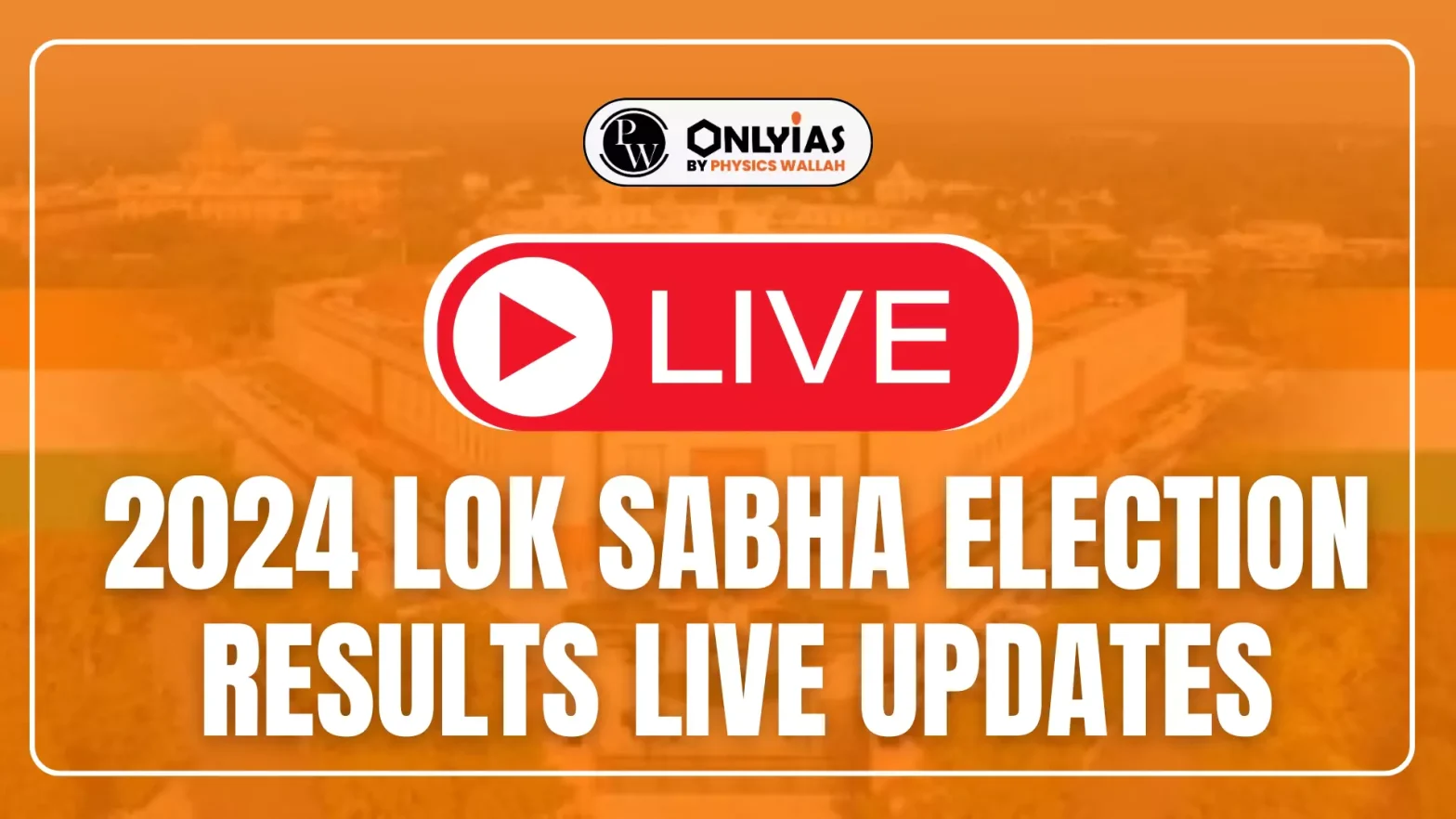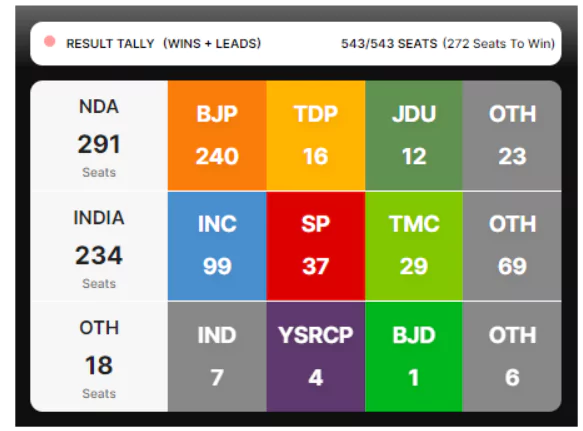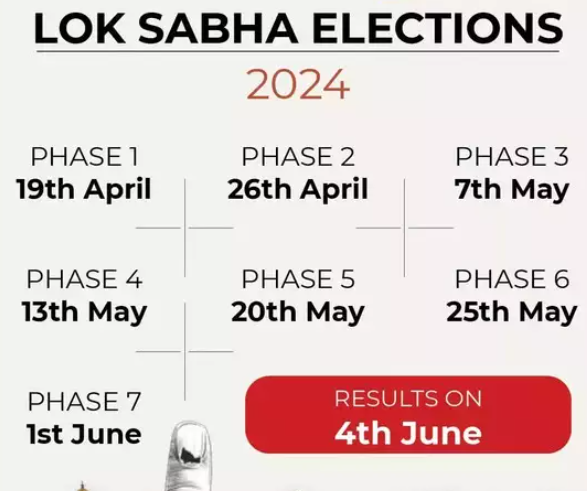The 18th Lok Sabha election, conducted from April 19, 2024, to June 1, 2024, in seven phases, has concluded. Today, on June 4th, the results have been announced by the Election Commission of India.

The 18th Lok Sabha election, conducted from April 19, 2024, to June 1, 2024, in seven phases, has concluded. Today, on June 4th, the results have been announced by the Election Commission of India.
The 2024 Lok Sabha elections have brought a thrilling contest as the Bharatiya Janata Party (BJP) nears 300 seats, while the opposition INDIA bloc has put up a strong challenge against the National Democratic Alliance (NDA) by leading 227 seats.
Winner: Poll pundits had predicted a third term for Prime Minister Narendra Modi, but the intense competition from the INDIA bloc has added an unexpected twist to the race.
Seat Share: The BJP is approaching the 300-seat mark, solidifying its strong presence across several key states.
INC Seat Share: The Indian National Congress (INC) is approaching 98 seats. However, The Congress-led INDIA Alliance managed to get around 227 seats.
Regional Dominance: Despite facing a tough challenge in Uttar Pradesh, the BJP has managed to maintain its stronghold in several regions.
The INDIA bloc, a coalition of opposition parties, has emerged as a formidable force, significantly impacting the NDA’s dominance in several states.
The bloc’s performance in states like Uttar Pradesh has been particularly notable, presenting a stiff challenge to the BJP’s dominance.
Prime Minister Narendra Modi: Narendra Modi has secured his third consecutive victory with 6,11,439 votes, defeating Congress’ Ajay Rai, who garnered 4,59,084 votes.
Constituency: Varanasi, Uttar Pradesh
Home Minister Amit Shah
Home Minister Amit Shah wins Gandhinagar’s seat by over 7.4 lakh votes against opponent Congress candidate Sonal Patel.
Constituency: Gandhinagar, Gujarat
| Parameter | 2024 Election Results (Live) |
| BJP | 240 seats |
| NDA | 294 seats |
| INC | 99 seats |
| INDIA | 231 seats |
| Samajwadi Party | 37 seats |
| All India Trinamool Congress | 29 seats |


| State/ UT | Total Lok Sabha Seats | Reserved Seats | |
| SC | ST | ||
| Andhra Pradesh | 25 | 4 | 1 |
| Assam | 14 | 1 | 2 |
| Arunachal Pradesh | 2 | 0 | 0 |
| Andaman and Nicobar Islands | 1 | 0 | 0 |
| Bihar | 40 | 6 | 0 |
| Chhattisgarh | 11 | 1 | 4 |
| Chandigarh | 1 | 0 | 0 |
| Dadra and Nagar Haveli and Daman and Diu | 1 | 0 | 1 |
| Delhi | 7 | 1 | 0 |
| Goa | 2 | 0 | 0 |
| Gujarat | 26 | 2 | 4 |
| Haryana | 10 | 2 | 0 |
| Himachal Pradesh | 4 | 1 | 0 |
| Jammu and Kashmir | 5 | 0 | 0 |
| Jharkhand | 14 | 1 | 5 |
| Karnataka | 28 | 5 | 2 |
| Kerala | 20 | 2 | 0 |
| Lakshadweep | 1 | 0 | 1 |
| Ladakh | 1 | 0 | 0 |
| Madhya Pradesh | 29 | 4 | 6 |
| Maharashtra | 48 | 5 | 4 |
| Manipur | 2 | 0 | 1 |
| Meghalaya | 2 | 0 | 2 |
| Mizoram | 1 | 0 | 1 |
| Nagaland | 1 | 0 | 0 |
| Odisha | 21 | 3 | 5 |
| Puducherry | 1 | 0 | 0 |
| Punjab | 13 | 4 | 0 |
| Rajasthan | 25 | 4 | 3 |
| Sikkim | 1 | 0 | 0 |
| Tamil Nadu | 39 | 7 | 0 |
| Tripura | 2 | 0 | 1 |
| Telangana | 17 | 3 | 2 |
| Uttar Pradesh | 80 | 17 | 0 |
| Uttarakhand | 5 | 1 | 0 |
| West Bengal | 42 | 10 | 2 |
Lok Sabha, also known as House of people, is the lower house of the Indian Parliament. It consists of members elected directly through an adult universal suffrage.
The members of Lok Sabha are elected by an adult universal suffrage and a first-past-the-post system. Every registered individual of 18 years can vote in the election.
The Lok Sabha speaker is elected from amongst the members of the house by a simple majority of members present and voting in the House.
The Lok Sabha elections of 2019 was won by the Bharatiya Janata Party (BJP)-led National Democratic Alliance (NDA). The leader of the alliance, BJP, won with a vote-share of 37.36% and won 303 seats.
The complete schedule of the General Elections 2024 will be announced by the Election Commission of India after March 13.
The dates for the Lok Sabha election is yet to be announced by the Election Commission of India. It is likely to be held between April and May 2024.
A Member of Parliament is elected by an adult universal suffrage and a first-past-the-post system.
Currently, there are 543 seats in the Lok Sabha. All the members of the Lok Sabha are elected.
For being qualified to become a member of Lok Sabha, an individual has to be a citizen of India; they must have attained 25 years of age and must not hold an office of profit under the Indian government or state governments.
An individual can become a member of the Lok Sabha by contesting and winning the Lok Sabha elections.
The first step is to file nomination for contesting the elections. If the nomination is accepted, they will feature as a candidate in the election. If they receive the maximum votes in the elections, they will be designated as members of Lok Sabha.
Yes. Sitting MLAs can contest Lok Sabha elections without resigning from their position. However, they will have to resign from any one position in case they win the Lok Sabha election.
MPs are elected through an universal adult franchise exercised by eligible voters who are 18 years and above.
A candidate has to attain a minimum age of 25 years to be eligible to contest in the Lok Sabha elections.
For an MP to become a Prime Minister, he/she should have attained an age of 25 years in case they are members of Lok Sabha and 30 years in case of Rajya Sabha.
Ganesh Vasudev Mavalankar was the first speaker of Lok Sabha.
The current speaker of the Lok Sabha is Om Birla.
The Prime Minister is the holder of the position of Leader of Lok Sabha if they are a member of the house.

<div class="new-fform">
</div>